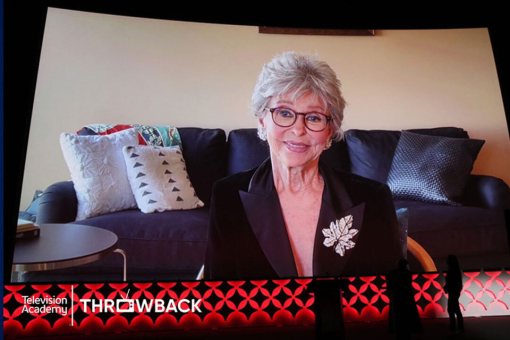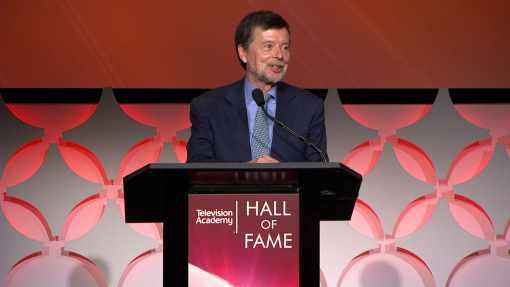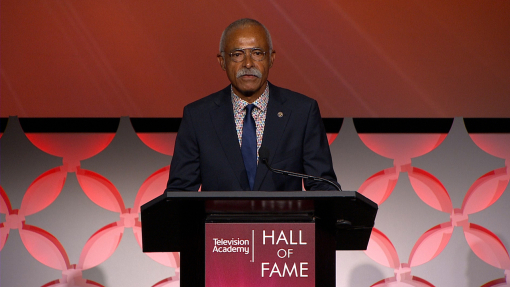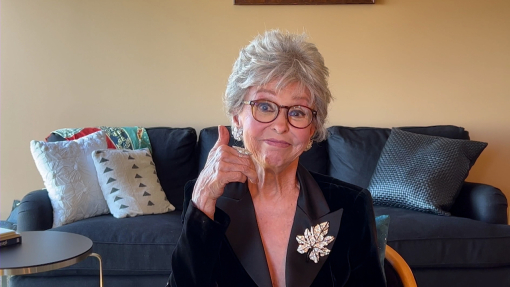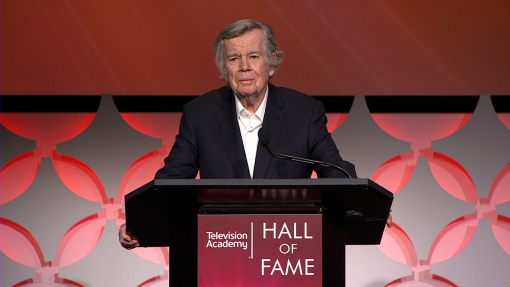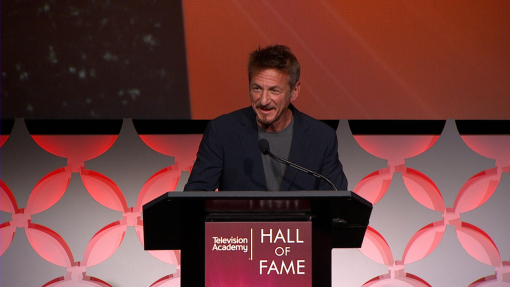Throughout his career, Leslie Moonves has had plenty of challenging roles. He’s been in charge of Hollywood’s busiest production studio. He’s lifted a network from worst to first. He’s even learned how to run a publishing empire and an outdoor billboard business.
Still, as he sits in his spacious office at CBS Radford Studios, he’s just hours away from something that will truly test his resolve. It’s not going head-to-head with anxious stockholders, problematic producers, or nosy reporters. Tomorrow, he will be dealing with a room full of wild three-year-olds high on cake and soda.
“I’ll be playing Mr. Mom this weekend because my wife [CBS News personality Julie Chen] is out of town, so I’m taking our son to a birthday party at one of those party places,” explains the beaming president and chief executive officer of CBS Corp. “I know it’s going to be pretty crazy, but honestly, I’m going to be loving it.”
It may be tough to picture the man who runs all things CBS — from the network, to the production studio, to Showtime, to the consumer products division — romping in a ball pit. Still, it’s that ability to live his life as a regular dad and husband that has apparently been the key to Moonves’ unrelenting success.
“His roots are in the real world, with real people,” explains Chuck Lorre, who currently is executive producer of three shows on Moonves’ network. “There are a lot of personalities and players in this town that put on a show that their friends in Brentwood will like and disregard the fact that it’s called broadcasting for a reason. But Les understands in his bones what it takes to find a big audience.”
Adds producer Jerry Bruckheimer, who has sold several shows to CBS over the years: “He’s in touch with the common man. His tastes are in sync with what people in this country want.”
That’s most likely because, according to Moonves, “I didn’t have anything even remotely close to show business in my early life. I was a normal kid growing up in a housing development on Long Island like normal people did after World War II. I liked TV, but it was certainly not a driving force in my life. I was more a sports guy.”
His father, Herman, owned and operated three New York-area gas stations, leaving the house at 6 a.m. every day and not returning until 8 p.m. Young Les would spend weekends working at the stations, but “I sort of hated it,” he recalls with a laugh. “I decided manual labor was not my strong suit.”
After graduating from Valley Stream Central High School, Moonves enrolled at Bucknell University as a pre-med student. He spent his junior year in Spain, and upon returning to college, realized a life in the sciences wasn’t in his future. He’d performed in a few school plays and enjoyed that well enough, so in 1971, he traveled to Manhattan to study acting at Sanford Meisner’s Neighborhood Playhouse.
Living in a Greenwich Village walkup, tending bar and learning everything from acting to ballet were “the two greatest years of my life,” he explains. “It opened up my whole world.” However, it didn’t open wide enough to offer many big acting opportunities, so, in 1976, Moonves packed up and moved to Los Angeles in search of a career on television. After a few small roles, like handing a telegram to William Shatner in an episode of Barbary Coast or playing the main heavy for a week in The Six Million Dollar Man, one thing became very clear. He was on the wrong side of the camera.
“I always knew, even when I was in acting school, that I wasn’t that good an actor. And I’m not someone known for his humility, so that’s really saying something,” he says. “It’s like when I was younger and played on the high school tennis team. I thought, ‘I could do something with this.’ Then I played against a guy who was really good and said to myself, ‘You’re not bad for a kid from Long Island, but you’re not going to be great.’ Acting was the same for me. It was more a means to an end. I sort of knew I wouldn’t end up making my living doing it, but I didn’t know where the road would take me.”
Initially it led him to producing theater, with his friend, actor Gregory Harrison. Then, another friend, Warren Littlefield, set him up for an interview for a job in current programming for NBC. He wasn’t hired, but Littlefield then arranged for him to meet producer Saul Ilson. That led to his first corporate job, at Columbia Pictures Television, and at age 29, he realized, “I was a little older and a little behind, so I felt like I had to work harder.”
After a year and a half soaking up everything he could learn about television development at Columbia, Moonves moved to 20th Century Fox Television and then, in 1985, to Lorimar, as an executive handling movies and miniseries. Four years later, he was named president of the studio, which became Warner Bros. Television in 1993. And even though it had been more than a decade since he’d done any acting, the stage work may have helped turn a pair of shows into the biggest hits the studio had ever had.
“Maybe it’s because of his acting background, but his track record of finding actors is fantastic,” says David Stapf, president of CBS Television Studios, who has worked with Moonves since the Lorimar days. “Whether it was George Clooney or later pushing for William Petersen or Anthony LaPaglia, he just knows who is going to be a successful TV star. He becomes very dogged in his insistence that we have to find the right project for these people.”
Always actively involved in the casting of his series, Moonves pushed hard to land Clooney, whom he felt was perfect for the role of Dr. Doug Ross on a new medical show called ER. Early on, he also championed Jennifer Aniston, feeling certain that she’d be an unforgettable Rachel Green on Friends.
His instincts were correct, and as a result, TV networks began courting Moonves, wanting him to apply his magic touch to their entertainment divisions. At the time, CBS seemed the least likely destination, given its sinking schedule featuring aging shows like Evening Shade and Murder, She Wrote. Still, as a guy who insists he’s “always looking for new challenges,” he decided to make the leap in 1995.
“Those first couple years here were pretty lonely,” he recalls. “And sure, there were some second thoughts about making the move. I’d left this great setup working at Warner Bros. to come here. I knew what we wanted to do would work. I just had to say to myself, ‘This is going to take longer than I thought.’”
Two of his first moves were to bring in an established comedy star — Bill Cosby — and a comic that nobody knew — Ray Romano. The former agreed to star in the self-titled comedy Cosby, while the latter would star in the self-created series Everybody Loves Raymond. At first, neither series made much of a ratings dent, but after Moonves decided to move Raymond from Friday to Monday night, and pair it with Cosby, he had his first CBS hit.
Moonves’ next big scheduling move was riskier. In the fall of 2000, CBS had an instant hit with the crime drama CSI. The show was a success on Friday nights, but he decided to switch it to Thursdays, where he had also decided to put a new reality show called Survivor that was doing well on Wednesdays.
“That was really taking a chance,” the exec admits. “We were taking our biggest show on Wednesday and our biggest show on Friday and moving them to Thursday. If it hadn’t worked, we were essentially killing three straight nights of programming.”
It was a decision that at first didn’t sit well with Bruckheimer, whose company produced CSI. “He scared me, to be honest. We were doing quite well on Friday, and here he was, putting us up against all the big NBC shows on Thursday. I thought, ‘Oh, God! No!’ But he was right. He has such a great instinct for these things. He’s always trying to raise the bar, and that forces all of us to be better.”
Three seasons ago, Moonves put the same fear into Lorre when he opted to shift The Big Bang Theory from Monday to Thursday. Explains Lorre:
“The move boggled my mind initially, but I’ve got no complaints now. I mean, just look at his track record. There’s too much consistency and continuity under his leadership at CBS to call him lucky. So when he walks in the room, you stand up, you take a knee, you do what you have to do. It’s Les Moonves, for God’s sake!”
Moonves’ name may generate “a little awe and a little fear” in Hollywood, according to Stapf, but his boss is also “the nicest guy in the business. He’s somebody you can level with. Somebody you can talk to. His charisma walks into every room with him.”
As much fun as he has in conference rooms, though, there’s one place more than any other that means the most to Moonves these days: the family room. “My weeks can be pretty crazy, but even when I’m going out for a dinner meeting, I’ll pop home first to spend time with my son,” he says, beaming again. “I’ve sneaked home to watch Harry Potter with him. I’m loving every second of it. My life is so full professionally, but it’s also full personally. I’m a very lucky guy.”
This tribute originally appeared in the Television Academy Hall of Fame program celebrating Leslie Moonves's induction in 2013.


